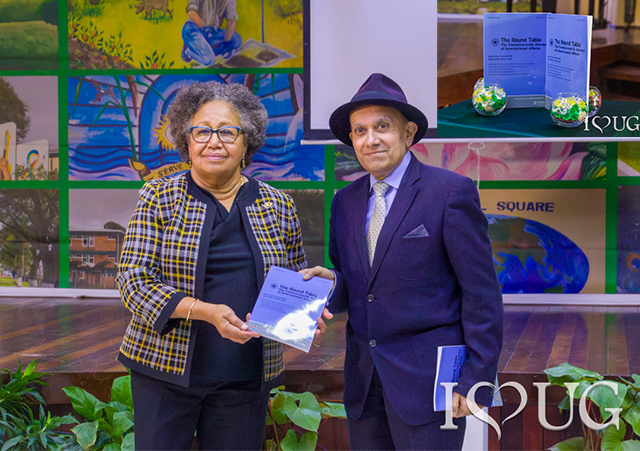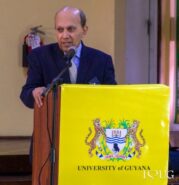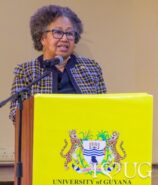 CARICOM Secretary-General Carla Bennett Round Table Journal editor Venkat Iyer. Inset shows special CARICOM edition. [photos: University of Guyana]
CARICOM Secretary-General Carla Bennett Round Table Journal editor Venkat Iyer. Inset shows special CARICOM edition. [photos: University of Guyana]
A special issue of The Round Table: The Commonwealth Journal of International Affairs commemorating the 50th anniversary of the founding of the Caribbean Community (Caricom) was launched in Georgetown, Guyana on 30 April 2024.
The event was hosted by the University of Guyana whose Chancellor, Edward Greene, was a contributor to the special issue. Among those who spoke at the event, in addition to Chancellor Greene, were: Carla Bennett, the Secretary-General of CARICOM, who delivered a keynote address; Professor Tavis Jules of Loyola University Chicago and guest editor of the special issue; Professor Paloma Mohamed Martin, Vice-Chancellor of the University of Guyana; Dr Mellissa Ifill, Deputy Vice-Chancellor, Institutional Advancement, University of Guyana; Professor Alissa Trotz of the University of Toronto; and the Editor of The Round Table, Dr Venkat Iyer.

Dr Venkat Iyer
The event was preceded by a special lecture to the faculty and students of the University of Guyana and to invited guests from the media, judiciary and the legal profession on ‘Hate Speech and Fake News: How Far Should the Law Go?’ by Dr Iyer which was chaired by Christopher Ram, a prominent local attorney, chartered accountant and television host. The lecture, held under the auspices of the School of Law, adopted an interactive format, with many questions flowing from the audience.
In her keynote address to the launch event, the Secretary-General of CARICOM complimented The Round Table for bringing out the special issue, which she said would “serve as a valuable resource for generations to come”. Noting that “the amount of independent research and discussion on things CARICOM has declined significantly,” she hoped that the process would be reversed.
Dr Bennett set her speech against the historical development of Caricom which was, she explained, “a collaborative and coordination mechanism with a number of specialised Regional Institutions, some of which even predate the establishment of CARICOM.” Those institutions include the Caribbean Court of Justice, the Caribbean Disaster Emergency Management Agency, the Caribbean Catastrophe Risk Insurance Facility, the Caribbean Examinations Council, the Caribbean Regional Fisheries Mechanism, the Caribbean Community Climate Change Centre, the Caribbean Agricultural Research and Development Institute and the Caribbean Public Health Agency. Caricom’s objective is, in her view, “to build a sustainable Community with an acceptable quality of life, with people at the centre of our development policies, strategies and initiatives strengthening the national development of individual Member States.”

CARICOM Secretary-General Dr Carla Bennett
Among the issues that the organisation is concerned with are climate change, the crisis in Haiti, food and nutrition security, improving reliable transportation links in the region, and acceleration of digital development and transformation. “There is,” she said, “no denying that there is room for much more to be done to realise the fundamental ideals set out in the Revised Treaty of Chaguaramas. We recognise that our challenges are not insurmountable, as thorny as they may seem. I am pleased to acknowledge the strengthening of collaboration among our Member States and our Regional Institutions in addressing issues together as we move forward. The decisions taken so far to strengthen governance arrangements, including by ensuring that the voices of the private sector, labour, civil society, and especially young people are heard, will continue to be implemented.
“Going forward, we will be seeking greater involvement of our universities, research bodies, and experts resident in the Region and in the diaspora, in providing a broader range of advice and perspectives.”
Concluding her address, Dr Bennett struck a hopeful note: “CARICOM has enjoyed five decades of incremental success … It is now the turn of this generation not only to secure and improve on those gains, but to use the creativity, ingenuity and dynamism that characterise Caribbean people to reimagine the next 50 years of CARICOM – to complete those things that we have not yet accomplished and set out and continue to expand our horizons.”
Special edition of The Round Table Journal – CARICOM@50
The special issue of journal was widely welcomed. In his address, Dr Iyer encouraged the audience – which also consisted of many who had joined the event online through live-streaming – to write for the journal as he was keen to encourage content from the Caribbean Commonwealth. He fielded many questions from participants; there was a particular interest on the subject of Open Access and its implications for both The Round Table and those wishing to publish in the journal, especially from the developing world.



